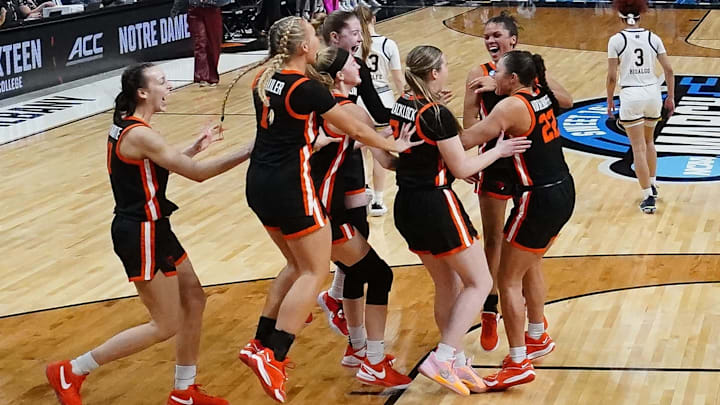Tide of Transfers: The New Reality in Women’s College Basketball

Oregon State Beavers coach Scott Rueck sat at the podium last March in what should have been an enviable spot. For just the second time in program history, the Beavers were in the Elite Eight, and their group was not just talented, but also quite young. Here was a situation that would traditionally have a coach preparing to run it back the next season. It instead had Rueck fielding questions like this:
How concerned are you that your core players will all transfer out now?
“Well, that would be logical,” said Rueck, a bit ruefully. “That’s reality.”
It would have been hard to argue. No program is immune in modern college sports, whatever its current success or previous track record. In the weeks that followed, eight players transferred out of Rueck’s program, including most of its big names. Some important context here: The Beavers had been left out in the cold with the dissolution of the Pac-12, sending them from one of the game’s strongest conferences to a veritable no-woman’s-land. The example is one of the more extreme from this summer. But it’s illustrative nonetheless.
To get a full sense of the impact of the transfer portal—of its many rebuilds and revolving doors—trace a path outward from Oregon State.
Start with third-team All-American forward Raegan Beers, a 6' 4" junior who chose Oklahoma. Meanwhile, Pac-12 Sixth Player of the Year Timea Gardiner went to UCLA, where another top player to leave the conference, Washington State’s Charlisse Leger-Walker, joined her. Across town, USC welcomed Beavers guard Talia von Oelhoffen, who is now teammates with another star transfer, forward Kiki Iriafen out of Stanford. Guard Donovyn Hunter landed at TCU, where the roster now includes one of the biggest names from the portal this summer, Hailey Van Lith. And former Oregon State guard Dominika Paurova chose Kentucky, a program that almost completely remade itself, with new coach Kenny Brooks bringing along some of the top players from his previous job at Virginia Tech, including guard Georgia Amoore and 6' 5" center Clara Strack.
That level of player movement can feel dizzying, but it’s all part of the massive change college basketball has undergone in recent years. Conferences have broken apart and been smashed back together in geographically questionable new shapes. NIL collectives keep paying up and paying out. The coaching carousel spins as fast as ever. It’s only natural that players are on the move, too.
The reasons for the movement can include the chance to play for a beloved coach. (“This is my second dad,” Amoore said of Brooks when they played their last game at Virginia Tech.) It can be a chance to make a Final Four. (That’s a strong possibility for transfers like Iriafen and von Oelhoffen, joining a strong core at USC.) It can be an opportunity to boost draft stock or refine skills. (This was seemingly part of the equation for Van Lith, who switched from point guard to shooting guard last season when she transferred from Louisville to LSU and will now likely return to her natural position at TCU.)
The degree of change is hard to process for coaches old enough to remember the comparatively placid era of, say, five years ago.
“I was scared of [this entire transfer world] at the beginning,” Rueck said at the Elite Eight. But he learned to adapt to it. “You’d better be on your ‘A’ game all the time, you’d better take care of people, and you’d better provide a great experience.”
So after last year’s tournament run, Rueck will start fresh, or something like it. Oregon State will be in an old conference that will feel very new. There will be freshmen to coach up. And, of course, there will be some other new faces: Rueck brought in four transfers through the portal.
